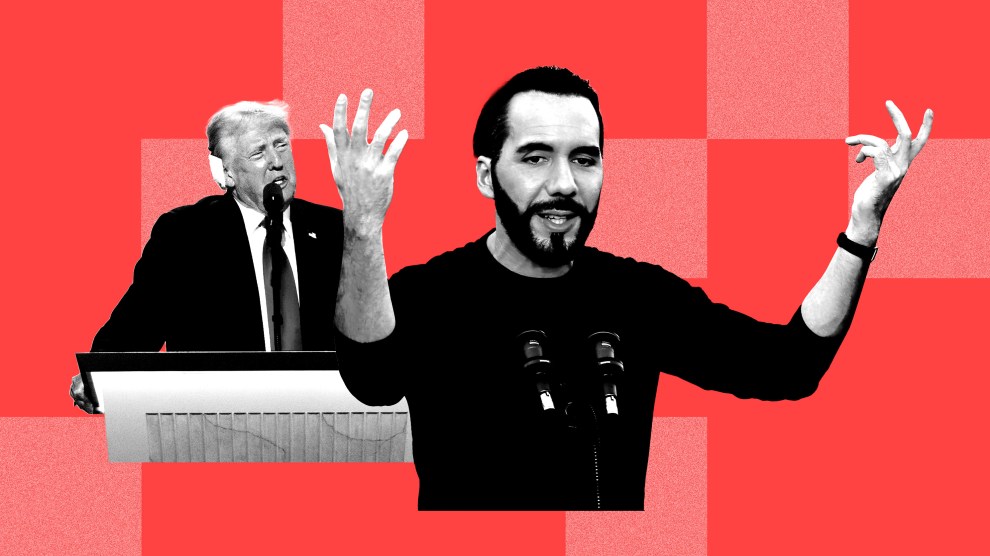
Mother Jones illustration; Salvador Melendez/AP; Aude Guerrucci/MAXPPP/ZUMA
In February, El Salvador’s President Nayib Bukele, fresh out of a landslide reelection victory, was welcomed at the Conservative Political Action Conference (CPAC) with a standing ovation. “You’re a true leader,” an audience member shouted as he took the stage and tried to talk over cheers and cries of “We love you, papa.”
He warned the CPAC crowd: “Dark forces are already taking over your country. You may not see it yet, but it’s already happening.”
Bukele, who has fashioned himself as the “world’s coolest dictator” and a “Philosopher King,” has become a darling of US conservatives because of his iron fist rulings and draconian crackdown on crime and gangs. After a trip to El Salvador in 2023, Sen. Marco Rubio (R-Fla.) praised Bukele and the country as a “bright spot” in the region. And just last month, Tucker Carlson attended Bukele’s inauguration alongside Rep. Matt Gaetz (R-Fla.), Sen. Mike Lee (R-Utah), and Donald Trump Jr.
“Nayib Bukele locks up the gangs, throws out the corrupt judges, unapologetically embraces God, and rebukes globalism with facts and results,” Gaetz posted on X. “He is beloved by his people, and an inspiration to the Western World.”
But perhaps all this adulation has gone too far in the eyes of another leader who can do no wrong by conservatives. During his speech on the last night of the Republican National Convention in Milwaukee, Donald Trump took an unexpected jab at Bukele, with whom he cultivated a friendly relationship while in office.
While repeating his racist rants about an “invasion” at the border, Trump said crime rates were going up in the United States because certain countries are “taking their criminals and they’re putting them” here.
“A certain country, and I happen to like the president of that country very much, but he’s been getting great publicity because he’s a wonderful shepherd of the country,” Trump explained without explicitly naming Bukele, and then continued: “He says how well the country’s doing because their crime rate is down. And he said he’s training all of these rough people…But then I realize he’s not training them; he’s sending all of his criminals, his drug dealers, his people that are in jails, he’s sending them all to the United States. And he’s different in that he doesn’t say that.”
Trump then punched harder: “He’s trying to convince everybody what a wonderful job he does in running the country. Well, he doesn’t do a wonderful job.” He immediately followed the criticism of Bukele with a renewed pledge to “launch the largest deportation operation in the history of our country.”
In what appears to be a response to Trump’s speech, Bukele posted on X: “Taking the high road.”
It should go without saying that Trump’s suggestion that El Salvador is “exporting” criminal actors to the United States is false. It is a fact, however, that Bukele has been successful at bringing down crime rates in a country once known as the murder capital of the world. He did so by instituting a “state of exception” and indiscriminately arresting thousands of people without regard for due process, while silencing the press, amidst what international groups decry as widespread human rights violations worse than during the country’s civil war.
Whether Trump’s remarks reflect a threat to his ego or something else, they likely expose diplomatic short-sightedness. If re-elected in November, the GOP nominee and his future administration will have no choice but to work with the president of El Salvador on some of the very issues Trump and the party purport to care about, chief among them migration and drug flows.
As president, Trump entered deals with the governments of El Salvador—as well as Guatemala and Honduras—to push asylum seekers to request protection in those countries before coming to the United States. The Biden administration subsequently rescinded these so-called “safe third country” agreements. If he wants to continue such cooperation as president, this is an odd way to say so by Trump.

















